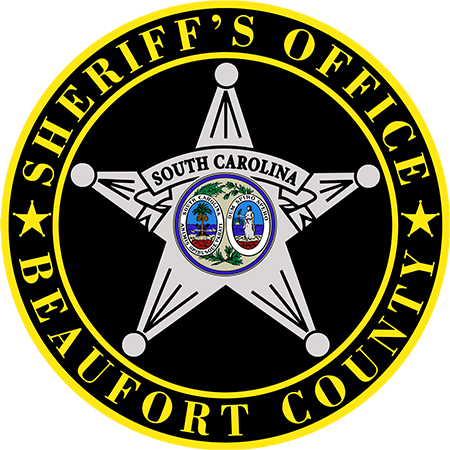History of the Sheriff's Office
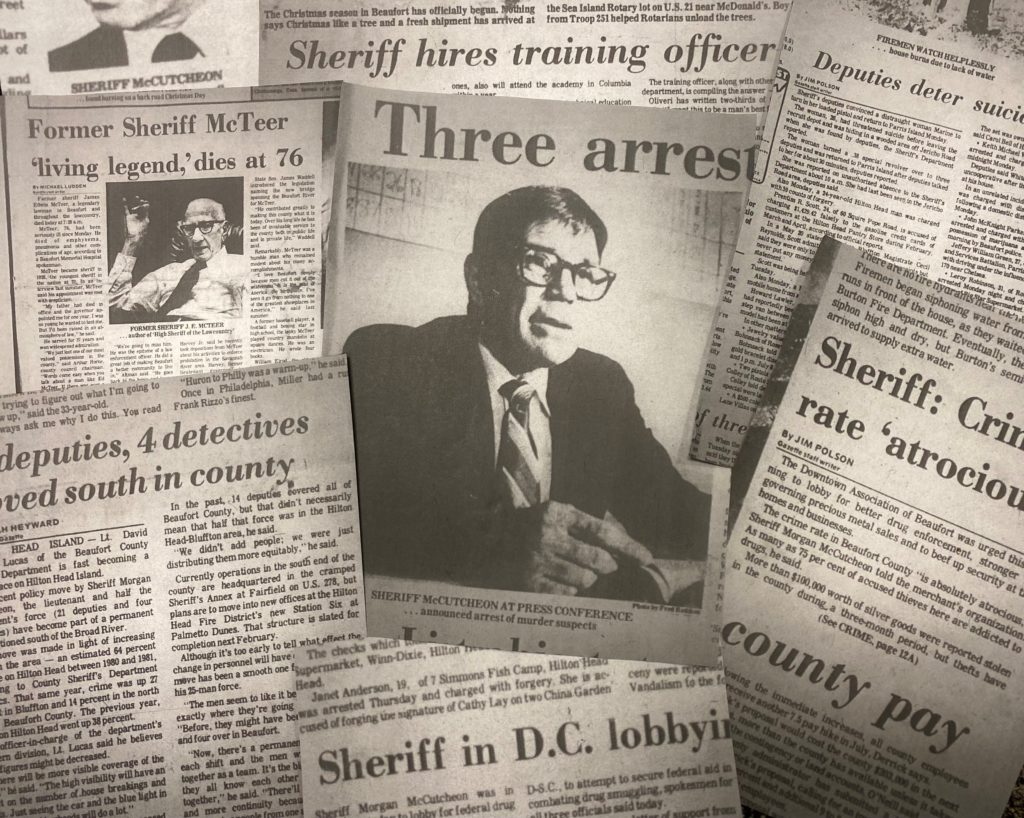
250-plus years of serving the community
The Beaufort County Sheriff’s Office began with one man in 1769. As of April 2021, 242 sworn, certified law enforcement officers and 95 civilian personnel work together to meet the mission of safeguarding all residents and guests of this county.
The term “sheriff” has its origins in old English history.
When kings ruled England they supported their kingdoms through a taxation program. It was necessary to have an individual collect those taxes for the king.
King Alfred in 890 A.D. appointed an individual upon whom he bestowed the title “Reeve.” The term is defined as “guardian.”
Among the duties of the Reeves were tax collection, mediating disputes and posse comitatus, which gave Reeves the authority to command others to assist in keeping the peace in the kingdom.
Alfred went further and determined geographical jurisdictions over which the Reeves had authority. These geographical locations were called “shires.”
Thus when the people naturally combined the two terms, “Shire” and “Reeve,” it became “Sheriff.”
The Office of Sheriff is the longest continually standing office in civilized history.
Although English rule changed as various kings become stronger and took larger parcels of land, they kept the Office of Sheriff established.
In approximately 1190 A.D., King Henry II expanded the duties and responsibilities of the Sheriff as well as established the right to trial for the accused and the powers of a grand jury.
Henry’s directives were expanded in the next century with the passage of the Magna Carta, the forerunner of our Constitution. The Office of Sheriff is mentioned no less than 27 times in that powerful document.
Among the duties were apprehending criminals, assisting other sheriffs, operating the jails and conducting executions.
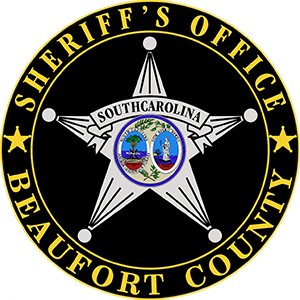
The Lords Proprietors — the eight loyal supporters who received large tracts of land in present-day Georgia, North Carolina and South Carolina from the King of England — were given the authority to appoint Provost Marshals for the various districts under their leadership.
At this point in history Beaufort did not exist as a separate entity.
The Town of Beaufort was founded in 1711 and answered to British authorities in Charleston.
The Provost Marshal for the District of Charleston had full authority of a sheriff for the entire district including Beaufort. The scant records available indicate that there may have been a town marshal appointed in Beaufort to keep the peace. General Sessions Court was held at Charleston.
The Circuit Act of 1769 was issued by King George to address the growing daily demands of administering a set of colonies 3,000 miles from the seat of power in London.
The Circuit Act created several judicial circuits in South Carolina including Charleston, York, Ninety-six, Georgetown and Beaufort — initially known as Granville District. Within a short time, it was changed from Granville to Beaufort District.
Among the offices created by the Circuit Act was the Office of Sheriff. The Office of Provost Marshall was changed to the Office of Sheriff.
The Legislature (also appointed by the King) was given the authority to appoint the sheriffs for the various districts.
Roger Pinckney IV was the sitting Provost Marshall at Charleston. He was offered and accepted the position of Sheriff for Beaufort District.
In 1776 the Council of Safety, established as part of the revolution, recognized the need for the Patriots to control as many elected offices as possible. They appointed a Charleston blacksmith, Tunis Tourent, as the first sheriff of Beaufort District. Tourent ardently supported the cause of the rebellion against King George.
Although their terms were two years, no new sheriffs were appointed between 1776 and 1781 because Beaufort changed hands several times between the British and Colonial forces.
In 1781 William Rose was appointed Sheriff. Rose would be followed by a succession of notable Beaufort citizens in the Office of Sheriff.
Between 1776 and 1810, sheriffs were appointed by the Legislature for a single two-year term. They could only serve longer if no successor was appointed.
In 1810 the first Constitution for the State of South Carolina was ratified and the Office of Sheriff became an office elected by the people every two years.
At least 24 men held the Office of Sheriff between Tourent and the outbreak of the Civil War in 1861.
Thaddeus G. Buckner was serving as Sheriff when hostilities began. In addition to his role as Sheriff, Buckner joined the Confederate 3rd South Carolina Cavalry Regiment.
Buckner was severely wounded at the Battle of Pocataligo in October 1862. Although he recovered, he was unable to resume his duties after the war due to lingering health issues.
W.J. Gooding was elected to the post, however he held it less than two years.
In 1867 the United States Congress passed the Reconstruction Act, which barred any citizen who had served the Confederacy from holding any public office.
Alfred Williams was elected to the office as a Republican. He was the first of a series of Northern men to hold the office who came to Beaufort during or immediately after the war. These included Williams, George Holmes and William “Little Billy” Wilson.
Henry Elliott, a native son, was elected to the office of Sheriff after the Reconstruction Act was repealed in 1876.
Succeeding Elliott, a Democrat, was George A. Reed. Reed, a Republican, was born enslaved in Port Royal. At the time of his election in 1884 Reed was listed on the Fusion Ticket as a moderate Republican. He had already served on the Town Council of Port Royal and as a county commissioner.
The Fusion Ticket was a compromise between moderate Democrats and moderate Republicans to restore power to the citizens of Beaufort County and remove the influence of outsiders. Reed’s opposition during the campaign included Robert Smalls in a very crowded field.
Reed served two full terms that included the Great Storm of 1893, the strongest hurricane to strike Beaufort County, killing more than 2,000 citizens.
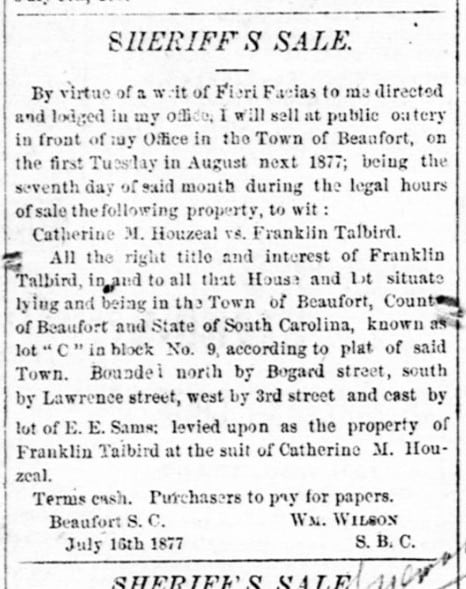
The period between 1882 and 1924 was a difficult one for sheriffs of Beaufort County, with six dying in office. All died of illness and disease, most at reasonably young ages.
The final death, in 1924, was James E. McTeer. McTeer had served as Sheriff from 1904 to 1912. He lost the office in 1912 to former deputy Matthew O’Driscoll “Mattie” White. White died in office while campaigning for reelection in 1920. Although Deputy Sheriff Danny Mann was appointed interim Sheriff, he lost the general election to James Wilson.
Wilson would survive one term and lose to McTeer in 1924. After taking office, McTeer would arrest Wilson for illegally manufacturing and dispensing liquor. McTeer became ill and died in office.
Sheriff James McTeer’s 23-year-old son, J.E. “Ed” McTeer was persuaded to accept the appointment of the Governor to the unfulfilled term of his father, who died in office.
He went on to hold the office for over 40 years. He lost his campaign for reelection in 1962 to L.W. Wallace, ending one of the longest consecutive runs in the United States.
During his tenure in office, Ed McTeer had strived to bring professionalism to the Sheriff’s Offices of the entire state through his tireless support of the SC Sheriff’s Association. He installed the first two-way radios in patrol cars in the County. He fostered relationships with federal agencies including the Alcohol Tobacco and Firearms Department and the F.B.I.
L.W. Wallace, a former SC State Trooper, was able to increase the size of the agency by nearly 100 percent, having 13 deputies on staff in 1969 and 20 in 1974. He increased the fleet of patrol cars, incorporated radar and traffic enforcement into their duties and added a boat to assist in patrolling the vast number of islands in the County. He also created the first central dispatch office, serving the Sheriff’s Office and several fire districts. When EMS was created in 1974 they were incorporated into the dispatch office.
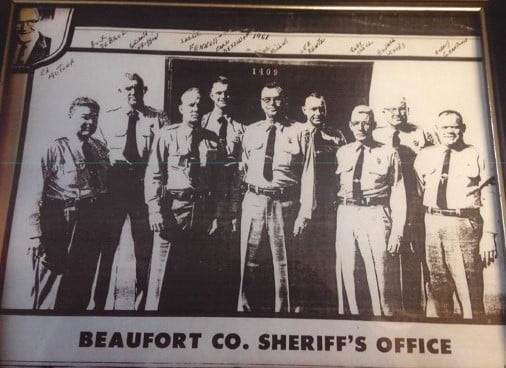
Beaufort County Sheriff J.E. “Ed” McTeer is pictured in the upper left corner. Pictured from left are Buck Debruhl, Gerald Griffin, L. Fennell, Earl Bessinger, O.C. Mitchell, Lee Rentz, Roby Cahill, Howard Woods and Gerry Grantham. This photo was taken in 1961.
Morgan McCutcheon, a retired Marine, was appointed Sheriff in 1977 to fulfill the remainder of Wallace’s term after he retired from office due to health reasons.
McCutcheon brought state of the art communications in the form of an 800 MHz radio system that put every first-responder in Beaufort County on the same network. He created a full scale Central Dispatch Office in 1989 that brought all dispatching services under one roof and incorporated the new 911 emergency phone number into Beaufort County operations.
Beaufort County was the first agency in South Carolina to install mobile data computers in the first responder vehicles, completing that project in 1990.
Under Sheriff McCutcheon’s leadership, the Beaufort County Sheriff’s Office was on the cutting edge of all technology during the 1980s and early 90s.
McCutcheon retired in 1990 and was succeeded by David Lucas. Lucas served one term and retired, being replaced by Carl McCleod. McCleod narrowly won the office over P.J. Tanner in 1994 after Tanner had defeated a field of five Republican challengers in the primary. Tanner returned in 1998 to defeat McCleod by a margin of 123 votes.
Sheriff P.J. Tanner has continued to build on the legacy created by Morgan McCutcheon, adding the first drug analysis laboratory in the lower part of South Carolina in 2001. He has successfully directed the efforts to establish the lab, video forensics processing technology, the incorporation of in-car video cameras and body-worn cameras, satellite communications, internet, web-based internal communications and on-board computer technology in each vehicle.
Tanner has also added staffing, taking the agency from approximately 150 officers in 1999 to 240 officers and nearly 100 civilian personnel including emergency services dispatchers in 2021.
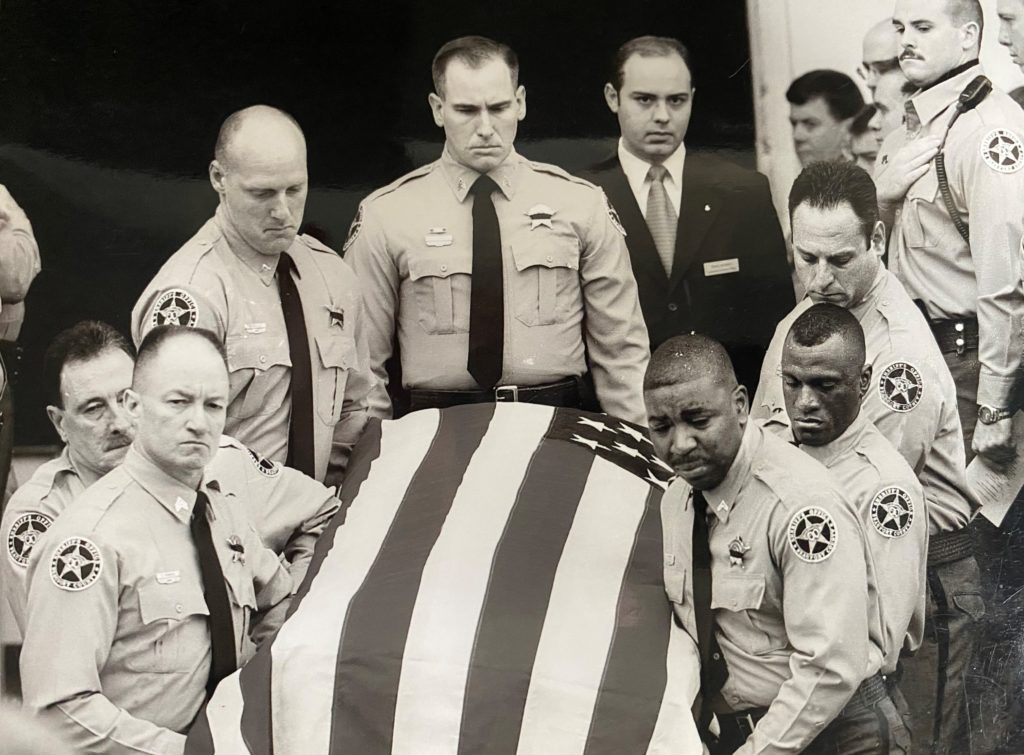
In Memoriam ...
The first law enforcement officer to die in the line of duty in Beaufort County was a State Dispensary Constable (the forerunner of the Alcohol Beverage Control officers). Constable J. Rollins Cooler was shot and killed from ambush at the Corner intersection on St. Helena Island on April 12, 1915. His brother, W.M. Cooler, was a deputy sheriff at the time. Deputy Cooler would later safely and professionally escort the convicted killers to prison in Columbia.
On Jan. 6, 1925 Deputy Benjamin Paul Cardin would be shot and killed while serving an arrest warrant in Seabrook. Deputy Elmo Langford would die violently just two years later on June 6, 1927 while investigating a reckless driving complaint in Grays Hill. In each of these cases the killers were caught and convicted.
Sixty-three years would pass before another officer would be killed in the line of duty. Russell Bell was shot to death by a prisoner he was escorting on April 17, 1990.
The worst single day for the BCSO would wait for another 12 years. On Jan. 8, 2002 Dyke Coursen and Dana Tate were shot and killed from ambush while responding to a domestic violence disturbance call for help.
The men involved in the Bell and Coursen-Tate cases were apprehended and convicted.
In the line of duty ...
In its 250-plus year existence, the Beaufort County Sheriff’s Office has paid the ultimate sacrifice on several occasions.
JULY 1996
Deputy Sheriffs received a call for service concerning an individual who was driving recklessly in a small mobile home park on U.S. 21 in northern Beaufort County. Upon their arrival at the park, the suspect had parked the car but picked up a shotgun from his mobile home.
He began shooting at the arriving officers.
Deputy Sheriff David Kistler was wounded by the suspect.
A member of the Port Royal Police Department, Officer Steve McGregor, was on his way to work and was passing the location. He stopped to lend his assistance and was also wounded in the gunfire. The suspect subsequently surrendered but was found mentally incompetent to stand trial. He later committed suicide.
JANUARY 1998
Deputy Sheriff Jason Covington was shot and wounded while pursuing an armed robbery suspect.
The Taco Bell Restaurant on Hilton Head Island had been robbed near closing time by three suspects.
As officers arrived on the scene, they spotted a suspicious vehicle fleeing the scene. An attempt to stop the vehicle resulted in a high speed pursuit that ended behind the Hilton Head High School.
The suspects fled in various directions on foot.
Deputy Covington responded along with his K9 partner, Arno. Together they tracked one of the suspects into the housing area of Hilton Head Plantation.
As Covington and Arno passed the pump-house to a residential swimming pool, the suspect, who was hiding behind the structure, stood and opened fire with an automatic assault weapon.
Both Covington and Arno were wounded.
Covington returned fire and wounded his attacker. Other officers arrived moments later and took the wounded suspect into custody. Covington and Arno were taken for medical treatment. Both recovered and returned to duty.
AUGUST 1999
A Port Royal Police Officer, Sergeant John Griffith, was ambushed at Sutcliffe Mobile Home Park while on patrol by an individual who had claimed to be harassed by the Port Royal PD.
The suspect’s girlfriend flagged down Griffith to get him stopped. Griffith was then shot while still seated in his patrol car by the suspect who was hiding inside a mobile home and wielding a high-powered hunting rifle.
Griffith, although severely wounded, was able to drive his patrol car out of the line of fire and radio for help.
The suspect then shot the next three officers to arrive at the scene before he could be brought to bay by additional responding officers.
Of the three additional officers wounded, two belonged to the City of Beaufort Police Department and the fourth was from Port Royal.
Sheriff’s deputies were quick to respond into the Town of Port Royal and helped bring the situation under control, with Deputy Grant Hall risking his life to rescue one of the wounded officers while under fire.
The suspect committed suicide rather than surrender.
JUNE 2015
The BCSO SWAT team was serving a Federal Search Warrant for the DEA in Royal Pines. After entry was made into the residence, SWAT team members encountered a locked bedroom door. Team members breached the door open and immediately received gunfire from inside the room.
The shots just missed one team member’s head but one bullet struck Sergeant Mark Cobb in the upper left arm.
Additional SWAT officers responded to the bedroom and the suspect, who was the target of the investigation, eventually surrendered and was taken into custody. Sgt. Cobb returned to full duty.
These officers all survived and returned to their duties.
The sheriffs of
Beaufort County
The boundaries of Beaufort County look a lot different today than they did in the 18th century. From 1769-1785, what was then called “Beaufort District” included all of Beaufort, Hampton and Jasper counties. For a short time, the district was divided into four counties — Granville, Hilton, Lincoln and Shrewsbury — before once again becoming Beaufort District. In 1868, Beaufort District was designated Beaufort County.
